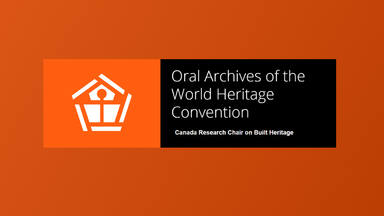
Interview
Jean-Louis Luxen
World Heritage Convention
After obtaining a doctorate in law from the Catholic University of Louvain, Belgium, Jean-Louis Luxen completed studies in economics at Stanford University in California.
From 1973 to 2006, he had a distinguished career as Director-General at the Ministry of Cultural Affairs of Belgium. From 1989 to 1993 he chaired the Cultural Heritage Committee of the Council of Europe, before being elected Secretary General of ICOMOS from 1993 to 2002. In this capacity he supervised the participation of the advisory body at sessions of the World Heritage Committee and participated in several expert meetings, including the Nara meeting in 1994 and the intangible World Heritage meetings held in Zimbabwe in 2000 and 2003.
Since 2002, Jean-Louis Luxen presided over CHEDI (Culture, Heritage and Development - International) and has been Treasurer of the International Coalition of Sites of Conscience since 2010. Professor at the University of Louvain for more than twenty years, he has written extensively on heritage as a vector of economic development and on the immaterial dimension of built heritage. He recently published an analysis of the relevance of charters and conventions («Is There a Need for a Charter on . . . the Wise Use of Charters and Conventions?», Change Over Time, 4/2, autumn 2014, p.462-469).
Interview with
Jean-Louis Luxen
26 March 2009, Louvain, Belgium
The audio excerpts are from an interview with Jean-Louis Luxen by Christina Cameron the 26 March 2009 at Louvain in Belgium. These excerpts reflect his optimistic and sometimes critical vision for the objectives and impacts of Convention. They clarify a number of issues that have arisen during the period of his involvement from 1993 to 2002: the politicization of the Committee, the creation of the World Heritage Centre and the Nara meeting. Jean-Louis Luxen's in-depth knowledge of ICOMOS also offers an interesting perspective on the work of the Advisory Bodies.
- 1. The World Heritage Convention
- 1a. Involvement and role of Jean-Louis Luxen in the World Heritage Convention
- 1b. Objectives of the World Heritage Convention
- 1c. World Heritage List
- 1d. Key moments and decisions in the implementation of the Convention
- 2. World Heritage Committee: balance between professionals and diplomats
- 3. The advisory bodies: ICOMOS, IUCN and ICCROM
- 4. The secretariat of UNESCO
- 5. The conduct of States parties, international solidarity and tourism
- 6. The Nara document
Oral Archives of the
World Heritage Convention
Under the leadership of the Canada Research Chair on Built Heritage at the University of Montreal, an international team of researchers conducts interviews with pioneers of World Heritage to capture memories of important moments in the history of UNESCO Convention.
Launched in 2006, this initiative is part of the UNESCO History project that celebrated the 60th anniversary of the creation of UNESCO. The Oral Archives project records the precious witness of people closely associated with the creation and implementation of the Convention. Their recollections and views have greatly enriched the book by Christina Cameron and Mechtild Rössler, Many Voices, One Vision: The Early Years of the World Heritage Convention (Ashgate/Routledge, 2013).
